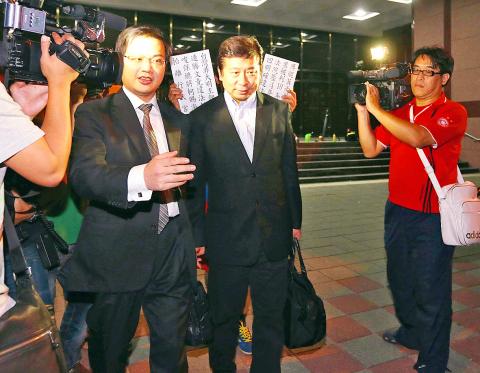President Ma Ying-jeou (馬英九) yesterday downplayed the potential impact of alleged information leaks to China by former Mainland Affairs Council (MAC) deputy minister Chang Hsien-yao (張顯耀), calling it a “ripple in the strong wave of cross-strait developments.”
The remark follows his comment the day before comparing Chang to a “pest” in cross-strait ties that has to be eliminated — the first time Ma responded to the weeks-long scandal.
The president said the suspected leak was just a “ripple” that would not affect cross-strait developments, adding that Taipei and Beijing currently enjoy the “most stable period in cross-strait relations over the past 65 years.”

Photo: CNA
Speaking at a ceremony to mark Armed Forces Day, the president said the government would continue its efforts to promote cross-strait relations, but it has to be predicated on mutual respect and legitimacy for it to be in the interests of Taiwan and its people.
Separately yesterday, the Taiwan Solidarity Union (TSU) caucus called on Ma to report to the Legislative Yuan on the state of the nation after the legislature’s plenary session commences on Sept. 12, saying that since the president had likened Chang to a “pest,” he should explain who had nurtured the “pest” and allowed it to grow.
TSU caucus whip Lai Chen-chang (賴振昌) said that since Ma is the head of the state and, according to the Constitution, the highest person in charge of the national security system, and Chang was officially appointed by the president to take charge of cross-strait negotiations, Ma has to report to the nation since he was the decisionmaker and an interested party in the case involving national security.
TSU Legislator Chou Ni-an (周倪安) said that Chang, Mainland Affairs Council Minister Wang Yu-chi (王郁琦) and the Presidential Office have changed their stories several times since the dispute broke out, and the whole brouhaha has already caused damage to national security, cross-strait developments and diplomatic affairs.
Chou said Ma has been unapologetic and has acted as if nothing has happened, when he should be held accountable.
The Chinese-language United Daily News yesterday also ran a headline story claiming that Chang’s trusted assistants might have released at least 30 confidential documents to a Taiwanese businessman, who handed them over to officials at China’s Taiwan Affairs Office.
The report said the Investigation Bureau found Chang’s secretary faxing from the Mainland Affairs Council office classified documents to a Taiwanese businessman who acted as the middleman between Chang and Chinese officials.
Another assistant of Chang might have also verbally disclosed classified information to Chinese officials, the report quoted the bureau as saying.
The Taipei District Prosecutors’ Office rebutted the report and denied earlier reports saying that Chang had been wiretapped.
Chang was released earlier yesterday at about 2am after being questioned for 12 hours.
Chang’s aide, Chen Hung-yi (陳宏義), and two others who were called in for questioning have also been released.

Seventy percent of middle and elementary schools now conduct English classes entirely in English, the Ministry of Education said, as it encourages schools nationwide to adopt this practice Minister of Education (MOE) Cheng Ying-yao (鄭英耀) is scheduled to present a report on the government’s bilingual education policy to the Legislative Yuan’s Education and Culture Committee today. The report would outline strategies aimed at expanding access to education, reducing regional disparities and improving talent cultivation. Implementation of bilingual education policies has varied across local governments, occasionally drawing public criticism. For example, some schools have required teachers of non-English subjects to pass English proficiency

‘FORM OF PROTEST’: The German Institute Taipei said it was ‘shocked’ to see Nazi symbolism used in connection with political aims as it condemned the incident Sung Chien-liang (宋建樑), who led efforts to recall Democratic Progressive Party (DPP) Legislator Lee Kun-cheng (李坤城), was released on bail of NT$80,000 yesterday amid an outcry over a Nazi armband he wore to questioning the night before. Sung arrived at the New Taipei City District Prosecutors’ Office for questioning in a recall petition forgery case on Tuesday night wearing a red armband bearing a swastika, carrying a copy of Adolf Hitler’s Mein Kampf and giving a Nazi salute. Sung left the building at 1:15am without the armband and apparently covering the book with a coat. This is a serious international scandal and Chinese

TRADE: The premier pledged safeguards on ‘Made in Taiwan’ labeling, anti-dumping measures and stricter export controls to strengthen its position in trade talks Products labeled “made in Taiwan” must be genuinely made in Taiwan, Premier Cho Jung-tai (卓榮泰) said yesterday, vowing to enforce strict safeguards against “origin laundering” and initiate anti-dumping investigations to prevent China dumping its products in Taiwan. Cho made the remarks in a discussion session with representatives from industries in Kaohsiung. In response to the US government’s recent announcement of “reciprocal” tariffs on its trading partners, President William Lai (賴清德) and Cho last week began a series of consultations with industry leaders nationwide to gather feedback and address concerns. Taiwanese and US officials held a videoconference on Friday evening to discuss the

PERSONAL DATA: The implicated KMT members allegedly compiled their petitions by copying names from party lists without the consent of the people concerned Judicial authorities searched six locations yesterday and questioned six people, including one elderly Chinese Nationalist Party (KMT) member and five KMT Youth League associates, about alleged signature forgery and fraud relating to their recall efforts against two Democratic Progressive Party (DPP) legislators. After launching a probe into alleged signature forgery and related fraud in the KMT’s recall effort, prosecutors received a number of complaints, including about one petition that had 1,748 signatures of voters whose family members said they had already passed away, and also voters who said they did not approve the use of their name, Taipei Deputy Chief Prosecutor